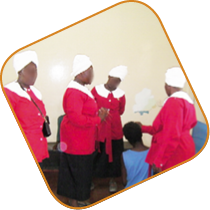6. Traditional healers
The World Health Organization (WHO) defines traditional medicine as
a diversity of health practices, approaches, knowledge and beliefs incorporating plant, animal and/or mineral-based medicines; spiritual therapies; manual techniques; and exercises, applied singly or in combination to maintain well-being, as well as to treat, diagnose or prevent illness. The comprehensiveness of the term […] and the wide range of practices it encompasses make it difficult to define or describe, especially in a global context.65
Traditional healing has been described as is “an integral part of culture, represents a sum total of beliefs, attitudes, customs, methods and established practices indicative of the worldview of the people”.66
 Photo: Women from Church of Zambia praying for female patient in the B Ward in Chainama Hospital. 30 October 2012 © MDAC.
Photo: Women from Church of Zambia praying for female patient in the B Ward in Chainama Hospital. 30 October 2012 © MDAC.
65 World Health Organization, Legal Status of Traditional Medicine and Complimentary/Alternative Medicine: A world wide review (Geneva: WHO, 2001), 1–2.
66 Olaniyi Bojuwoye, “Traditional Healing Practices in Southern Africa: Ancestral Sprits, Ritual Ceremonies, and Holistic Healing” in Integrating Traditional Healing Practices Into Counselling and Psychotherapy, ed. Roy Moodley and William West, (Thousand Oaks, CA: SAGE, 2005), 61.

